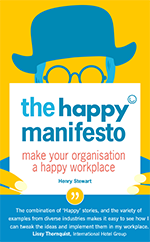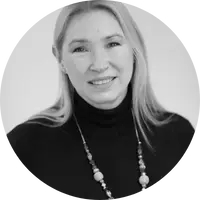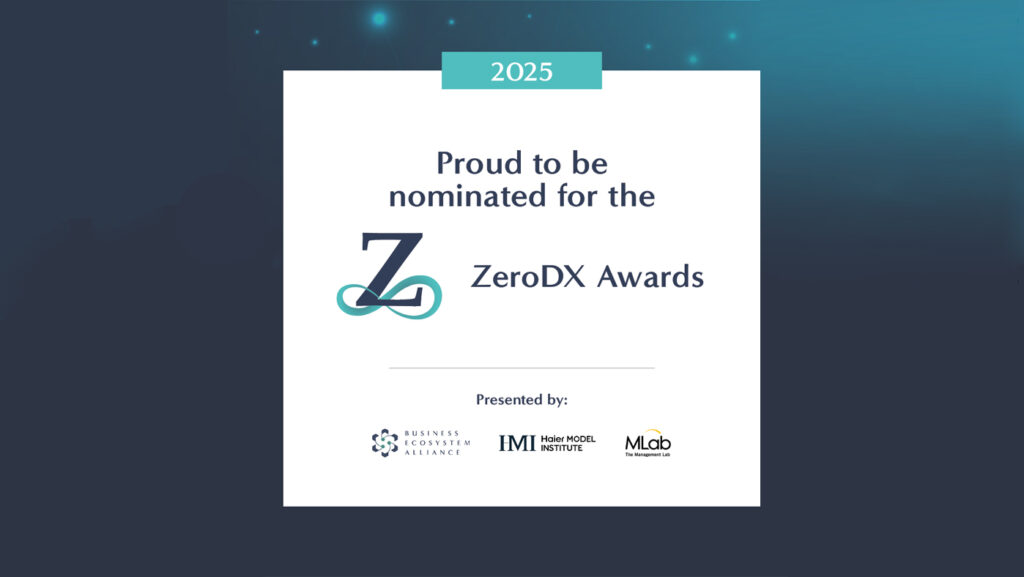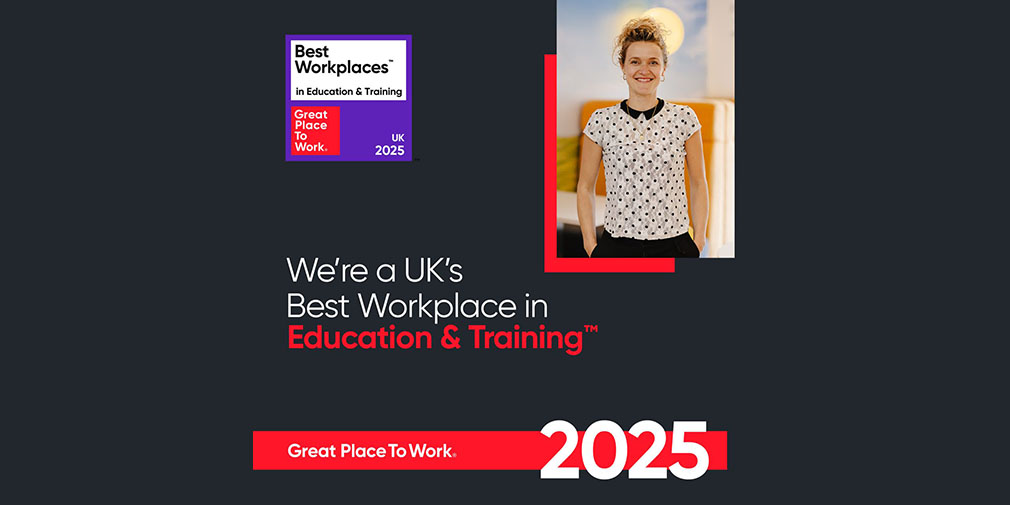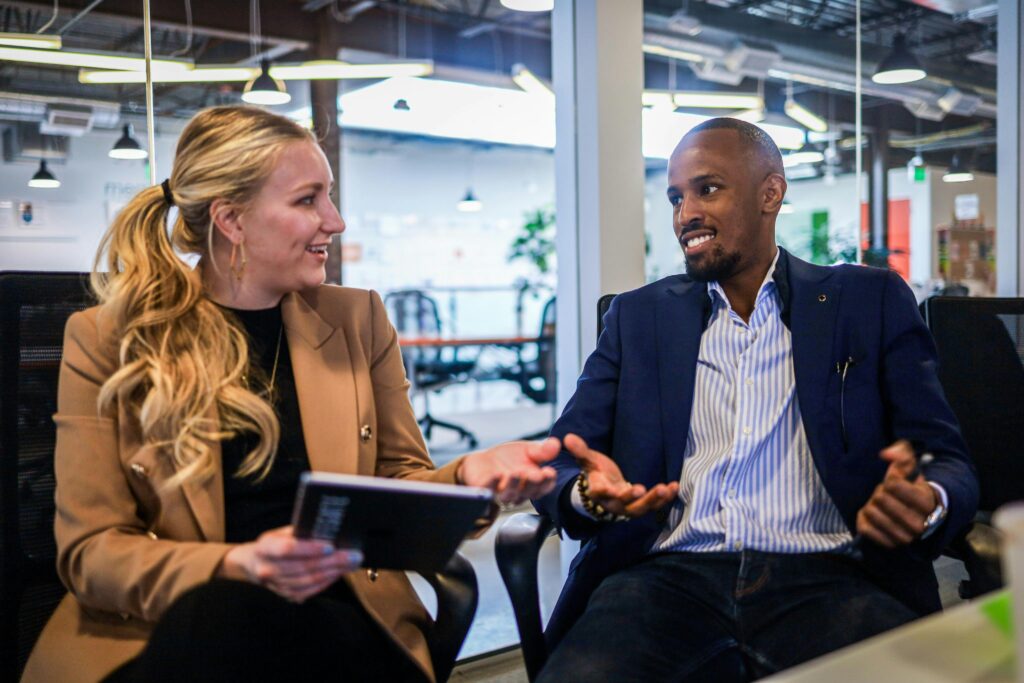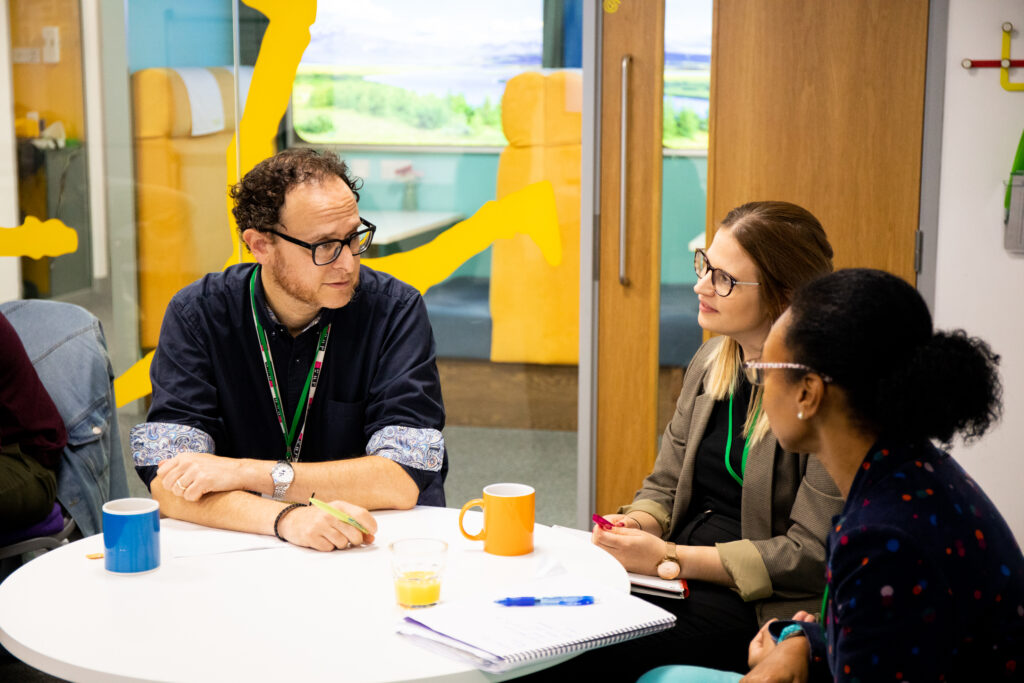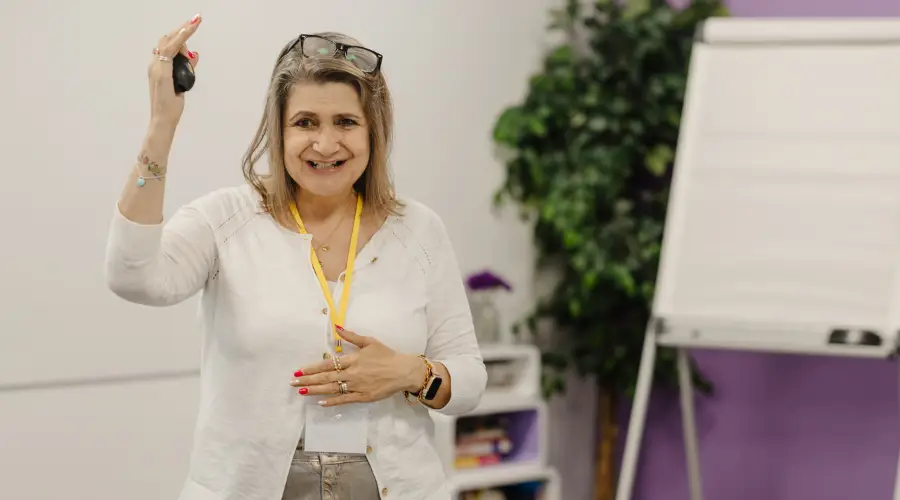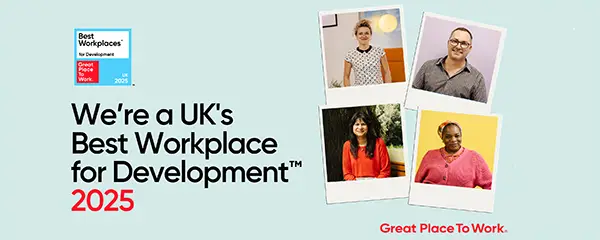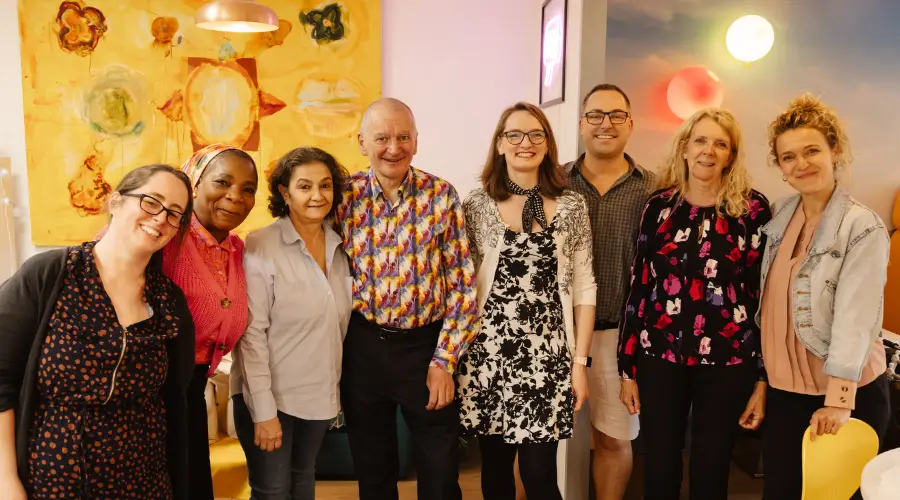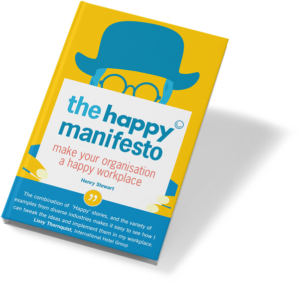Caron Bradshaw: So, there’s two words on this slide that I have problems with, or I’ve had problems with. The first is ‘loving’ and the second is ‘leadership’.
I’m going to talk about loving today, but leadership I think is one of those words that, people mis-use it, don’t they? They misunderstand it and they use it in the same way, much as we use the word strategy, to sort of say, “I’m strategic, but you’re not. I’m a leader, but you’re not”.
Leadership is sort of rooted in certain hierarchies, titles, and we tend to sort of use it, or some people use it, to kind of keep people out, don’t they? And I always think that there are people that can be seen as, they’ve had leadership running through them since they were born and others that you think, why on earth are they leaders? Nobody should have ever let them anywhere near leadership. So, I’m not going to say anything more about leadership per se, but loving is the thing I’m going to talk about today.
So why do I believe in loving leadership? I’m going to tell you a very brief story, I hope, I’m going to try and keep brief.
So, the Charity Finance Group is an organisation that stands for great charity financial management. It’s there to tell other people how they should manage their finances, to keep them at the top of their game, to showcase best practice. And yet we were a small organisation. And when I took over the organisation, I was sort of told, as most leaders are, all you’ve got to do is slip behind the wheel and put your foot down, it’s a well-oiled machine. And when you get in, you realise that actually, it’s not quite as well-oiled as you might have thought and that there are a few things that have been sort of pushed to one side, like the proverbial bit of cold broccoli for someone else to handle. So I spent the first three years of my working life at CFG implementing someone else’s strategy.
It was my first CEO job. I got to the end of that first three years and a lot of people were saying to me, well, Caron, you know, you don’t want to be stuck in infrastructure. So having done three years, having got the good results you’ve got, why don’t you use this to get another CEO role in a six or seven million organisation, and then you can get a 10 or 15 and then you’ll be able to get one of the top 100s and I thought, well, I don’t, I didn’t do this because I want to climb some greasy pole. I want, if it’s not too sort of “beauty pageant-ist”, I want to change the world. I want to do this because I want to have purpose and meaning.
So I persuaded my board to deal with all the things that hadn’t been dealt with previously. And there were a lot of them and I suggested to them that if they went on this big bang change with me that we could really take the place, you know, take the organisation another place, but that if it all went horribly wrong, this is what the bad side of it might look like.
Nobody thought that everything would go terribly wrong. However, long story short, every stone I lifted up, it was a little bit worse than I thought it was. And it went terribly wrong.
I ended up having a massive breakdown. I fell out with my board. Some of my board lost confidence in me. Long story short, I felt really under pressure, and I was exhibiting a lot of the things I think many of us do in leadership about, well, I broke it, so I’ve got to fix it. Kind of the hero piece of “I’m going to save the world and it’s only me that can resolve it”.
I was exhibiting a lot of the things that I think a lot of people think leadership is, around having all the answers, believing that you’re the only one that can affect change.
And during my breakdown, I had such love given to me by my chair that I believed the way forward and the way to recover from my situation and the way actually to learn from it to turn that breakdown into a breakthrough.
And if you know what this image is, have you ever seen this? This is kintsugi where you repair the damage with gold, and that’s very much what the experience felt for me. That actually what came out of it was much better and much stronger and much more beautiful for me and I felt that that was love.
So, let’s say what is love? Because you’re probably sitting there thinking well, no, she’s just a little bit strange So listen to this:
Scene from “The English Patient” (1996):
“Jeffrey gave me your monograph and I was reading up in the desert, very impressive.”
“Thank you.”
“I wanted to meet the man who could write such a long paper with so few adjectives.”
“A thing is still a thing no matter what you place in front of it. Big car, slow car, chauffeur driven car.”
“Broken car?”
“Still a car.”
“Not much use though.”
“Love, romantic love, platonic love, real love, quite different things, surely?”
“Uxoriousness, that’s my favourite kind of love. Obsessive love of one’s wife.”
“Now there you have me.”
So, what is love? Is love a ‘thing’?
Now when I’m talking about the fact that I had this breakdown and I recovered from it with love, I’ll give you an example of what that was for me. My chairman, who actually was the CFO of the Church of England at the time, stood by me. I never felt squashed, I always felt challenged. I never felt that he was trying to save himself, there was never a hidden agenda, he was always generous, he was always there, he was always patient, he always listened, he was always able to ask just the right sorts of questions for me.
One afternoon he was saying to me that “well, the thing is Caron that you know we need to get people back on the bus” and it was like someone flicking a switch for me.
I suddenly felt this sort of rage raise up in me, and I said “hang on a second, Dean. What if we were all on the bus together, and the people that are now not happy about this change had fallen asleep and now, they’ve woken up and they want to stop the bus and change direction, and that everyone else that was on the bus was quite happy with the direction that the bus is going. I don’t think this is okay. We should stop the bus and invite them to leave!”
And his simple response to me was, “welcome back, Caron.”
And from that point on, he was there, and he helped me and supported me to get through it. I felt with hindsight and with reflection that the essence of what got me through was love. And what I was not exhibiting in my workplace was love. It was the opposite. It was about my ego. It was about me being the right person, me having all the answers, me taking the decisions. And I was standing in the way of my team.
So, I’m going to ask you a question, which is that’s all very well and good. But when I talk about love, people go, “but don’t you just mean kindness or care or compassion?”
So that’s my question to you. What is it about love that sets it apart from kindness, care, compassion, all those other words that we might associate with or swap out for? So, let’s, let’s give you a few minutes to talk about that.
[break out space]
Caron: Super. Well, when we come to the end, I’ll be interested to hear some of your thoughts and share some of the discussions that you’ve had.
So, moving on. So, what is this thing called love? And maybe some of these conversations came up for you too. You may have, as by our little clip, thought about love as being a different thing depending on the word that sits in front of it.
So maybe, you know, divine love, romantic love, parental love, platonic love, brotherly love, self-love, tough love. So, all of these things, we’re all in agreement these are love?
So, what if I put toxic in front of the word love? Is that still love? Or would we say that’s not love? That’s something masquerading as love and it’s toxic?
Similarly, what about abusive love?
Then it starts to make me think, well is love a noun? Is it a thing? And are these adjectives that you would have describing a thing, actually just describing the thing, or is love not a thing, it’s an action, it’s a doing, it’s a… So I, I’ve sort of come to the conclusion, not that I’ve never been brilliant at English, so I’ve probably got, I’m still in the verb, doing, doing word, I’m still in that sort of primary school group, but for me that was an ‘aha’ moment. And it was an ‘aha’ moment in a discussion with my Chair, who said to me, well, you know, Caron, love isn’t a thing. It’s not, it’s not a noun. It’s not a thing that you can stick stuff on. It’s in here. So yes, of course, it encompasses all these other words of care and compassion. But it’s very difficult. It’s a difficult, tricky little thing to sort of pin down. We can’tt quite package it up into words.
So, if I asked you, do you love your child or your partner or your husband, you would, I hope unequivocally, say yes. Of course it might not quite be the case.
But if I asked you, do you love your member of staff? I think there’s an uncomfortableness about that, a real awkwardness about love. But we all know that we are human beings first and foremost, and we absolutely crave connection. And the thing that got me through my crisis was love. So why is it that I’m worried about dispensing love or experiencing love or sharing love with my staff? It doesn’t mean that I want to skip off on holiday with them, it doesn’t mean I have to like all of them. But I can exhibit the actions and behaviours of love in every situation that I encounter with them.
So let me tell you a couple of stories. I will be quite vague with one of them because I’ve only worked for two places, so it wouldn’t take you a long time to work out where the person was.
So, I had an individual, and whilst they were in the application process, I noticed on their CV that they’d been in work for about 18 months, two years. And then they’ve gone on like, travelling, and they do this periodically. So, when we interviewed this person, we asked them about this and they explained it away as being young and seizing the moment and going off and doing the thing that they wanted to do to expand their horizons, I thought nothing more of it.
About 18 months into that person working for me, working with me I should say, they suddenly disappeared. They were supposed to be speaking at an event for the organisation I worked for. And the first we knew that they disappeared was the host ringing us to say, where is your person?
And we tried to ring around the hotels, we tried to ring the airports to see whether or not they had made the journey. Nobody would tell us for data protection purposes, we were not their next of kin. And they turned up about three days later, just as we were about to report them missing to the police.
And they confessed that they’d had a psychotic episode, that they had a history of severe mental health, and that every 18 months or so, they would have this kind of thing happen to them, and it would floor them.
And so, in the conversations that followed on with the individual, we had to set the boundaries and say, well, look, it’s not okay to just leave this person hanging. That’s not okay. And we are going to have to warn you for that because that is falling short of the standards we expect of you. However, completely understand what’s happened to you. How can we help? What is it that’s going on for you? How can we ensure that if this ever happens again, you can tell us in ways that are accessible to you that you can’t work for us at this point in time because your world is upended. And they did, and we put strategies in place and that person carried on working for a long time and excelled in the job and didn’t move on.
So, it is that act of love. It did not mean I had to compromise on my standards. It did not mean that I had to be saccharine sweet and mootsy about it. I could be strong and set the boundaries, but I also, I think we were able to have this safety for that person to be able to be their full self and not to feel that every 18 months, two years, they had to jack their job in before they were found out and sacked.
So, that’s one story. Second story is not my story. And actually, I found that this person had spoken for Happy as well. He spoke for me. I met him at an event, and he came and spoke for CFG for us.
His name is Simon Lawson. He runs the largest independent, family-owned construction suppliers’ entity, does wood and building materials, called Lawsons.
And he shared at a CFG conference about an individual. He had normal sickness policies, et cetera, and an individual had come to work and said, I’ve just been diagnosed with stage 4 cancer. It’s terminal. I’ve got like six months. I don’t know what to do, because I am the sole breadwinner. Sickness policy is not going to pay my mortgage. I don’t have critical life cover or anything like this.
Simon took a decision to just pay him, full whack. You work when you can work. You don’t worry about sick leave. I’m just going to stand behind you.
Not only did he stand behind the individual, but he also stood behind the individual’s widow when he eventually passed away.
And the difference with his staff and that human connection, I think, was immense, immense. And Simon’s, if you’re not convinced, you might be feeling this is all, well, yeah, we can’t afford to do that – but you can’t afford not to do it, is my view.
Simon has [an amazing] retention rate. I think his turnover is something like 13%. In the construction industry, his competitors are 30%. In retail, generally, it’s 45%.
And we all know it costs us money when we’re having to recruit and replace people.
So, for me, love doesn’t just make sense on a human level. Love makes sense on a business level, because what we’re doing is, we are seeing. And I love Avatar. I love the way that it is, that there’s just something about “I see you”.
If you swap the word, see you for love, I love you. For me, this sums it up, being seen and seeing people for who they are, warts and all.
I spoke at Bain’s Business School the other day and one of the people that I spoke to, one of the students said “it’s a bit like having family, isn’t it really? Because in a workplace, you can’t always choose the people that you work with in the same way that you can’t choose your family. You don’t always like your family, but you love them.”
And even if you cut off ties with them, you still love them. That’s still an act of love. So, for me you know, that kind of sums it up beautifully.
So, my second question for you, then, because when I said the word love, I suspect for a number of you, you might have felt your buttocks clench. You may have felt slightly uncomfortable. And you know, love in the workplace feels a little bit risky and racy.
What is it that’s preventing us from bringing love into the workplace? And secondly, how do we change that, if indeed you think it ought to be changed? So, let’s break out for a few more minutes.
[break out space]
Caron: Welcome back. I hope they were really good conversations that you just had, but I just bumped into someone that was talking about something I’d cut out. So, I’m now going to share that because I have a little bit more time in that last minute before we open up for conversation.
When I went on this big change programme that I told you that led me to completely burning myself out, I had never done a transformation programme before, so I’d asked the board to give me a coach. And the coach that I had introduced to me by mutual friend, colleague. I went to see him, and he was very much unlike the business coach that I’d had when I started at CFG.
I sat down with him, and in the first five minutes he asked me the same question several times. “What do you want, Caron?” And I said, “well, I’ve got, you know, this transformational project to do. And I’d like-” “No, no, stop. What do you want, Caron?” And it went through several iterations till I burst into tears and said, “I just want to be happy.”
You know, I realised I just want to be happy as well. So, I thought, like we’d say.
So that’s all I’m going to share in terms of my sort of formal bits, but I’d really love now to have a conversation with you for the last 10 minutes, and hear what came out from your conversations, whether or not you’re like, yeah Caron still don’t think loves quite the word I’m going to take forward I’m, you know, not comfortable with that, I’ll use kindness, compassion, etc.
So, thoughts, views – and, if you’re online, putting some comments on Slido, I think is, is one of the things that we can interact with. So, who wants to go first?
Henry: Let’s go for Grace. You have some questions.
Caron: Go for it Grace.
Grace: Oh, I put a question in the chat, I think.
Henry: Yes.
Grace: Oh, was it really good?
Henry: It was really good.
Grace: I can read it off if you like. So yeah, I said so I’ve had a similar experience to you, Caron. And as you’re talking, I’m going, yes, I’ve experienced it. It’s not really a question, it’s more of a comment. So, when I had mine five years ago, I was wanting to keep it all to myself, all to myself, but actually, when you see people on the human level, that is what makes it go through.
And I’m all about the love and I’m also a practising Buddhist really, really proud to be. But love goes a long, long way. And it’s not just about love, hugging, blah, blah, blah. It’s about seeing people and respecting others, seeing people as your partners, and having that equality and that equal respect. So, I love what you’re saying, Caron. Oh, I’m so happy and in awe that you’re talking about, especially, as a CEO, talking about that because people don’t share this kind of stuff and it’s just inspiring, so thank you.
Caron: Thank you.
Right, so there’s a couple of things I want to say back to you, thank you firstly for that, it was just wonderful, and I’ll look this way now because that’s weird. You’re going to all see the back of my head.
And the first thing is that you don’t get points, necessarily for loving easy people, and some of the people that I found love the most useful tool of being people that I don’t particularly like. There are probably two people in my life that I’ve actively disliked. And one of them I had to serve on a committee with. I was the chair, and they were on the committee, and they drove me insane.
But what I found was, digging into love, I was able to say, oh, I noticed that you’re having a conversation over there about this thing that we’re discussing right now. I’d really like to hear what you have to say about it. Can you bring that into the group so we can all benefit from that conversation?
Now, you might think that that’s, oh, I’m being incredibly passive aggressive or I’m being sarcastic, but I genuinely thought, do you know what? The fact I don’t like this person is irrelevant. They may have something really important to say and I need to sound out the bad stuff about how I’m feeling about them because otherwise I could lose the diamonds in the dirt. So, I mean, that’s one thing that I think is really important.
The second thing, is that if you paid from a personal point of view, if you paid me all the money in the world, I would not forgo having a breakdown. It was the best thing that ever happened to me on one level because it fundamentally and profoundly changed me, and it is genuinely the gold that runs through it. You could literally go, here’s all the money in the world, Caron, and I would not swap it for turning the clock back and not having that experience, because it was a breakthrough as well. So, and apologies, that was really strange. Thank you Grace.
Maureen: Where are we going next. Another question? Online,
Caron: Can we go to you?
Audience Member: It’s inspiring how your experience of loving leadership helped you through the breakdown. And I’m just curious, other than role modelling loving leadership in your organisation, is there anything else you’ve done to try to promote a culture of love in the organisation and anything you can share with us?
Caron: So, I talk a lot about love. I’ve actually used an awful lot of stuff from The Happy Manifesto, which I think actually is the expression of love in so many ways. The things like Pre-Approval is a massive piece of love because it’s trust and trust is a fundamental pillar of love. I talked about love when we went through a restructure a few years ago which was driven by my senior leadership team and would result in them leaving it was quite a difficult thing for them once they realised actually this meant they would be leaving, even though they’d driven it, and I ended up writing, literally writing them a love letter.
I wrote them an email that said, this is a love letter and I, and I shared with them, this is going to be difficult. There are going to be points at which we are dealing with our emotions as opposed to our logic. And how we feel and our fear and our vulnerability. And I want you to be as authentic as you can be and, you know, just like if your kids are nasty to you, sometimes it’s because it’s an expression of their belief in safety, that I can be horrible to you because you’re not going to walk away from me. So, you know, to not react to that nastiness that sometimes comes, and understanding that what’s going on doesn’t stop it hurting, doesn’t make the uncomfortable comfortable, but it just gives you that insight to be able to say, what is it that they’re trying to express here and how do I move myself into a position where I’m not reacting to the emotion and to the noise, that I’m actually able to come through this and support them to express what it is they need to deal with and work through and wrestle and that can be emotional, it can be practical. But you won’t hear it if all you’re doing is reacting to the “ouch that hurt, after all I’ve done for you!” kind of thing.
And we’ve got values. So, our values are drafted by the team, and they are “I am” statements. And we have open conversations about how that works. I’m not going to say we’re perfect, we’re not, you know, we’re just like every family, we’ve got dysfunctional bits. But it feels like people feel more empowered to be able to say, actually, I don’t agree with that.
And more importantly, I feel comfortable in saying, I hear that you don’t agree with that, and here are the reasons why we’re going to do this, if that’s where we’re going. More often than not. I now want to not make decisions, I want to come out the way and let them do it, because they’re often the better placed people. And it’s like that sort of parenting piece of equipping your kids to be functional adults, you’re equipping your staff to do it all in their own right so you don’t need you anymore. Yeah.
Brendan: That was a really thought provoking and interesting speech, and I really had a joy of being somewhere in the process. I feel that, I’ll be honest, I feel a little bit uncomfortable with the notion of going into the workplace and saying to my colleagues, we’re now going to do “love”. … I’m still not quite there, I think, in terms of love as the answer.
Caron: You’re not alone. You’re not alone. It’s taken me 10 years to feel comfortable to use the word love. And I have been in many a conversation with a headhunter and they’ve said, tone down the conversation around love, Caron, it’s nonsense, don’t do that, talk about kindness and compassion, people are comfortable about that.
I would say, start where you, where you feel comfortable. Nobody has to use the word love. You can think it in here and it could be like stealth love.
We don’t need to run around saying, let’s all love one another, because I think if we do that, what we are not doing is helping people work through all of the things that we’ve talked about this morning around what is love. Immediately they’re going to be thinking about romantic love and parental love and all of those sorts of things, as opposed to love as being an action and embracing all these different aspects. So, for me, pull apart love and talk about trust, compassion, greed, you know, not being greedy, not being envious. All of the things that we know are our expressions of love. And I don’t need to use the word love. I’m just using it now because I feel comfortable with it, as opposed to where we start.
Henry: Okay, let’s go again for Michelle online.
Maureen: Can we have a question from online?
Henry: Michelle.
Michelle: I think for me, my question. I think I know the answer to this. But how do you set the boundaries for love in a workplace? I think that would probably be my question.
Caron: I think that’s excellent, and I think the thing is with all things like vulnerability, authenticity, etc., you have to have boundaries and you can’t be safe if you don’t have boundaries. And I recognise that for some people being authentic and vulnerable is a really loaded thing to do, it could be used against you and weaponised. So, I think you’re absolutely right about the boundaries.
And I think for us that started with a conversation with the team around values and the ways that we wanted to work together. I think that that was one way in which we were able to set the boundaries. And then I think it’s self-discipline, it’s setting those boundaries for yourself.
So, one of the things I didn’t share, but I think is really important in my recovery was that when things are going hard for us, we tend to go, “well, I can’t come down the pub and see my friends”, or “I can’t go out to the yoga class because I’ve got this paper to write”.
But actually, that’s the time we most need to be doing those things that are self-love. So, it’s boundaries, not just within the workplace, it’s boundaries for yourself too. And that act of self-love is actually the first step in going into loving leadership. It’s knowing yourself and loving yourself, even the bits you don’t like, because you can’t love other people genuinely and wholeheartedly, unless you can look in the mirror and go, yeah, I’m flawed, but I’m okay, I love who I am.
Are we all right time wise?
Maureen: Can we take one last question?
Audience Member: Can I just say, I absolutely love you. I mean, I never expected to say that, but I’m sitting here, I’m feeling so much love for you and for what you’re saying. It’s fantastic. I mean, I’m a coach in the leadership coach in the charity sector and I try and encourage my charity leaders to lead with love and I’ve had to kind of adapt the word and you know, people are uncomfortable, but hearing you speak, I’m like, yeah, this is actually what I’m doing and I’m going to carry on doing it.
Which prompts my question really, which is have you lost people on the way? Because they just didn’t get it. How do you feel about that?
Caron: So yes, is the answer, and I’m sure that he won’t mind me saying it. I had a finance professional who said to me about 18 months into me really starting to lean very heavily into this, you’ve changed over the last 18 months, and this isn’t for me.
But that’s absolutely fine. What do you want? How do we help you?
And he ended up leaving, did a bit of travelling, and then I’ve been his referee about five times for various different jobs. So it’s not that he took it personally, and I think that because of all the work that we’ve done, he got to a place where he was comfortable in saying, do you know what, I’m not ready for this and I might never be ready for this, and I might not even agree with some of the things that you do.
And that’s okay. I think we shouldn’t see people departing as failure. I mean, Femi’s point earlier about seeing somebody moving on I just sat there going, no way, word, yes, this is love. You know, this is recognising that what’s good for them is not sometimes, you know, not staying in the organisation, it’s moving on.
So yes, I have.
Audience Member: Wow, I think the fact that you can just like name one person for whom that’s happened is incredible, you know, because yeah, there is a resistance to this.
Caron: Thank you.
Audience Member: Thanks for sharing that.
